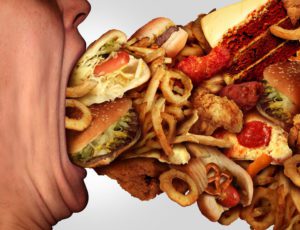ATTENTION: What are the signs of being a food addict and how to overcome food addiction…

“Is Food Addiction A Common and Very Serious Problem…”
Listen, you might be laughing at the whole idea of food addiction as a common and very serious problem…
Through research, scientists have identified when a person is battling any type of addiction.
The pleasure center in the brain undergoes natural changes.
When it comes to food addiction it is still controversial…
You see the same changes happening when a person eats hyperpalatable foods.
Find healthy eating bland or boring?
Your taste buds may need to be reset as a result of hyperpalatable foods.
Hyperpalatable foods are processed foods which are now easily and readily available everywhere.
Thanks to the power of our almighty food industry…
Over the years the food industry has changed dramatically.
And majority of foods produced in the United States are intentionally engineered.
Foods are manufactured in such a way as they surpass the reward properties of traditional foods.
Vegetables, fruits, and nuts just don’t cut it anymore…
Food chemists have engineered the ultimate food solution.
Simply by filling foods on the market with increased levels of fat, sugar, flavors and food additives.
In fact, food addiction is still not recognised as an eating disorder.
They means it can’t easily be diagnosed in clinical treatments…
However, a rapidly growing body of scientific research suggests otherwise.
And food addiction can actually exist.
Recent study of young American adult women found approximately 35% displayed addictive-like eating tendencies.
Certain foods and eating patterns can prompt behaviours…
And brain responses similar to those seen in drug addiction like cigarettes and alcohol.
These addictive-like eating behaviours could be contributing to overeating.
And as a result obesity in so many individuals.
Could it be an important piece of the obesity puzzle…
Is it food addiction, emotional eating or overeating…
Food addiction is commonly characterised using the Yale Food Addiction quiz.
The criteria used for substance addiction such as tolerance and withdrawal.
They’re comparing this to eating behaviours…
This interpretation of food addiction shares many similarities with above criteria.
It’s also being used to diagnose binge eating disorder.
Identifying loss of control and intense craving for specific foods.
So how can food addiction be set apart from other types of overeating…
Studies show there is around 50% overlap between individuals who display addictive-like eating behaviours.
And those who meet the diagnostic criteria for binge eating disorder.
These can also occur independently.
A more recent study revealed overeating should be viewed across a continuum.
Ranging from non-problematic occasional overeating to most severe and compulsive forms.
The most severe, which can be harmful to health and social life.
Is food addiction similar to drinking coffee, alcohol, tobacco or taking drugs…
It can be seen in the same spectrum with most severe drinkers labelled as alcoholics.
Food addiction may be better understood in the same way.
Representing the more severe subtypes of overeating.
The devastatingly powerful combination and affects of salt, fat and sugar…
In many human studies aimed at identifying foods associated with addictive-like eating.
The types of foods we typically self-identify as addictive are processed “junk” foods.
The foods which are engineered to be high in fat, sugar and salt.
For example in animal studies…
Using lab rats which are fed a healthy diet…
The lab rats do not show same addictive-like changes in the brain as rats fed highly palatable foods.
This suggests certain properties or ingredients may make specific foods more capable of triggering addictive-like responses.
The ingredients added to palatable foods may have properties which influence and trigger changes.
This includes a number of physiological factors.
Dopamine and hormones responsible for regulating appetite…
In simple terms very easy to eat foods because they taste so good.
And neurotransmitters in the brain produce “feel-good” chemicals.
The effects of highly processed foods mirrors those of other addictive substances.
More “engineered” or refined rapidly absorbed substances increase the rewards of addictive substances.
This is also not surprising from an evolutionary point of view…
Because potency of the rewarding ingredients is far greater in processed foods.
Much more than in naturally occurring foods.
A recent Australian survey found people with addictive-like eating tendencies…
They ate significantly higher intakesof high-kilojoule and packaged foods.
A study from the United States showed addition of rewarding ingredients such as fats and sugar…
As well as the level of processing increases addictive properties of food.
What if you think about what actually triggers an addictive eating episode…
It is difficult to separate food from the actual act of eating.
It is therefore likely both are rewarding characteristics.
The food as well as problematic eating behaviours play a role in addictive-like eating episodes.
And the increasing abundance of convenience foods in today’s food environment.
This relates to engineered or manufactured foods…
All these types of foods are easily accessible and heavily marketed.
And could be problematic for people with addictive-like eating behaviors.
Treating and targeting food addiction needs to be better understood.
In coming years, rigorous research is needed to better understand what food addiction means.
And how it can be identified and potentially treated…
Such a strategy could inform the development of better weight-loss treatments.
And more effective ways to target addictive-like foods or behaviours in certain individuals.
In addition, understanding underlying triggers (mechanisms) for addictive-like behaviours…
Could help identify new drug targets to treat obesity in some individuals.
This type of research may also inform better public health policy…
And environmental changes to help people make more informed decisions about their food.
This can decrease triggers of addictive-like eating in many individuals.
Eating an overabundance of these hyperpalatable foods causes a surplus of dopamine.
The brain chemical which makes you feel a sense of pleasure to flow is overwhelming.
This is the very same reaction which happens when a person indulges in drinking or using drugs.
The brain can’t handle excess of pleasure for a long period of time.
And it causes the body to decrease total number of dopamine receptors.
The only way to feel pleasure is when dopamine bonds with its receptor.
The result is a decrease in receptors because your own perception of pleasure has decreased.
This causes you to want more of the drug, alcohol or sugar, fat and salt.
And for so many women this is how food addiction begins…
And if food addiction runs in your family genes.
The chances of becoming addicted to food are significantly higher.
Are you constantly obsessing about food or your body image and weight?
If so, maybe you are ready to declare freedom from food addiction!
Click here if you relate to these types of behaviours or have any concerns about your eating habits…
 Can you lose weight eating anything you want? Yes, it is absolutely possible to lose weight and eat whatever you want.
Can you lose weight eating anything you want? Yes, it is absolutely possible to lose weight and eat whatever you want.



